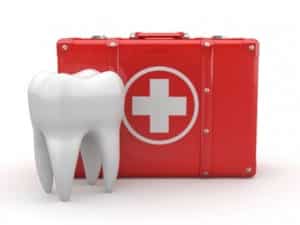
Dental emergency is a term used to describe incidences when you need to see your dentist as soon as possible, and is usually associated with pain.
Timely seeking of dental treatment in an emergency will improve the chances of saving the tooth or teeth, to prevent permanent damage and the need for more extensive or expensive dental treatment later on.
Common dental emergencies include when you experience a toothache, accidents involving your teeth, mouth or jaw such as a knocked out tooth, chipped tooth/lost filling or crown, and infections causing abscesses and swelling.
Toothache
Firstly, rinse your mouth with warm salty water to remove food debris. If your mouth is swollen, place a cold compress on the outside of your cheek. Take over-the-counter (OTC) pain medications such as paracetamol or ibuprofen (anti-inflammatory) to achieve temporary pain relief. See your dentist as soon as possible.
Abscess and Swelling
A dental abscess is a pus-filled swelling caused by infection inside the tooth or gums. It can be very painful and can cause facial swelling. If left untreated, the infection can spread to other parts of the body and may be life threatening.
Take pain relief medications such as paracetamol or anti-inflammatories for temporary pain relief and apply a cold compress to help control the swelling. If you see your medical practitioner, you may be prescribed antibiotics. However, this will not remove the source of infection and the infection can flare up again. It is important that you seek prompt dental treatment.
Knocked out Tooth
A knocked out tooth is a common dental emergency. If the knocked out tooth is a baby tooth, do not replant it back into the socket.
If an adult tooth is knocked out, pick up the tooth by the crown (smooth white part that is visible in the mouth). Avoid touching the root. If the root is dirty, rinse the tooth with milk or saline.
In a dental emergency, every effort should be made to put the tooth back into the socket as soon as possible and see a dentist immediately. Ideally, this should be within an hour of the injury. It is important not to delay this step and nor delay seeing a dentist. Once the tooth has been placed back into the socket, place a clean handkerchief over the tooth, and gently bite on it to hold it in position. If you cannot put the tooth back in, the following steps can be undertaken:
- Place the tooth in a cup of milk or saline.
- Do not put it in water as plain water can damage the delicate cells on the root that will help the tooth to attach back to the gum.
- If milk or saline is not available, put the tooth in the mouth between the cheek and the gum. It is crucial that the tooth is kept moist.
- Another approach is to spit saliva into a container and immerse the tooth in it.
- Then, see your dentist immediately.
Lost Filling or Crown/Chipped Tooth
If a crown falls off in a dental emergency, retrieve the crown and bring the crown with you when you see the dentist. If possible, place the crown back over the tooth.
If you have lost a filling, it can be painful because the exposed tooth surface is often sensitive to temperature or air. Try to see the dentist as soon as possible to have the filling replaced. This will prevent further damage to the tooth and the need for more extensive treatment.
A chipped tooth can leave you with a sharp edge, and if it’s one of your front teeth can affect the aesthetics of your smile. Make an appointment with your dentist as soon as you can so they can assess the chip and then discuss possible treatment options for fixing the problem, whether that’s filing back a sharp edge or a restoration.
Bleeding (injuries affecting your lip, cheek or gums)
If you experience injuries to the lip, cheek or gums, apply a clean bandage or handkerchief to the wound and apply firm pressure to help stop the bleeding.
If the bleeding does not stop in 10 minutes, seek immediate medical attention.
Jaw Pain
If you are experiencing difficulty eating or opening your mouth due to jaw pain, seek medical or dental care. In the short-term, to help alleviate pain, apply a cold compress onto the jaw area to reduce swelling and take anti-inflammatory medications such as ibuprofen for pain relief.
If a dental emergency occurs, please contact Smile Solutions to speak to our friendly reception staff to organise a prompt appointment. If it occurs after hours, call the dental emergency number.
